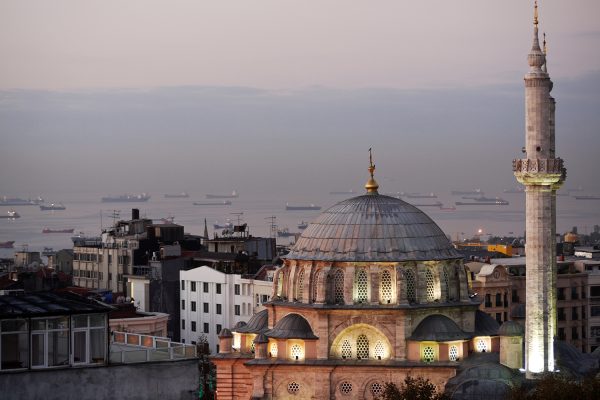
Critics of Turkish prime minister Recep Tayyip Erdoğan’s government rightly point out that his ruling Islamist party seems under the impression that democracy means calling an election every four years. This narrow definition of democracy is not unique to Turkey and the solution probably isn’t democratization in a political sense.
Secular dissatisfaction with Erdoğan’s supposedly “authoritarian” governing style and a perceived slide into Islamism through his ten years in office had long shimmered in Turkey but came to the forefront in Istanbul earlier this month when a protest against plans to build a shopping mall in one of the last remaining green spaces in the heart of the city sparked nationwide unrest.
Erdoğan seemed unimpressed. “We’ve been patient for far too long,” he lamented on Sunday. In a speech to lawmakers on Tuesday, he called on the demonstrators to leave. “It’s over,” he said. “As of now we have no tolerance for them.”
Hours later, riot police deployed tear gas and water cannons against the remaining protesters in Istanbul.
Erdoğan enjoys the backing of roughly half of the country, mainly Sunni Muslims who live in the Anatolian heartland but also businessmen who have benefited from Turkey’s economic rise in recent years. Minority Alevis and Kurds, by contrast, as well as young and urban voters tend to be less conservative but the opposition that caters to them is divided and feckless. In all likelihood, Erdoğan’s party will once again get a plurality, if not an outright majority of the votes in the next election.
Given their consistent and increasingly spectacular electoral successes, Turkey’s Islamists seem to have little regard anymore for the concerns of the nation’s minorities.
They are not alone. Egypt’s Islamists show similar disdain for the other half of the country that doesn’t share their view of how religion should inform politics. The sentiment isn’t even limited to the Muslim world. Despite the many checks and balances that prevent a “tyranny of the majority” in the United States, the polarization of the political spectrum there has gone hand in hand with a “winner takes all” mentality.
Even if this majoritarianism permeates into Mediterranean Europe, it is something that clearly distinguishes it from the European core where, Miguel Nunes Silva argued at the Atlantic Sentinel last year, “climate and weather have shaped the culture into giving primacy to the responsibility of the individual citizen rather than family or clan ties.”
Democratic decisionmaking based on consensus predated democracy in these societies which didn’t arrive, in terms of universal suffrage, until the late nineteenth or early twentieth century.
What distinguishes Northwestern European democracies is that they are liberal. This hasn’t to do with climate alone, rather a variety of factors, including a proximity to the coast, the necessity of trade, subsequent exposure to other cultures and a Protestant legacy that emphasizes the individual over the communal and wherein repentance involves more than a confession.
In the more southern societies, by contrast, wrote Silva, “climate and weather favor those groupings that manage to accumulate as many resources as possible and rise as high as possible in social status rather than generating these on an individual basis.”
Such a culture tends to be illiberal. In East Thrace, which includes Istanbul, and the cities on the Aegean coast, this is offset somewhat by commercial and cultural links with Europe but in the rest of Turkey, political liberalization is a slower process, if it is happening at all. Hence Erdoğan’s confidence in the face of what is the most serious challenge to his premiership and his party in ten years.
For decades, Turkey’s western elite imposed secularization on a conservative nation. Erdoğan reversed the trend. Democracy, uninterrupted by army coups, allowed the conservative majority that supports him to impose its moralistic views on the country, to the mounting chagrin of voters in the big cities. Abortion rights were restricted, headscarf bans in universities lifted and alcohol sales recently banned between ten o’clock at night and six in the morning.
Unlike Turkey’s liberals, seculars and religious minorities, the ruling majority is united, for now. Indeed, Erdoğan’s party could internally be strengthened when, under pressure from the protests, he scuttles his plans to expand the powers of the presidency which could align moderate Islamists against him.
Longer term, demographic and economic changes may yet tilt the balance in favor of the seculars again but if the way they governed in the past is any indication, that hardly guarantees that Turkey will become a “democracy” in the European mold soon. They will be tempted to overreach and repeal so many of Erdoğan’s “Islamist” policies that the conservative part of the country could rebel.
So Turkey would oscillate between different kinds of majoritarian rule until it learns that a democracy works not only when the majority decides but when the majority takes the minority into account.

Agree on most part, except:
Ataturk’s reforms were popular and well-received by a majority of the Turkish people in the 20s, 30s. Military coups first amputated any form of social materialism, liberalism and individualism which left Turkish politics swimming in a sea of communitarian, nationalist and illiberal social theory. Also, either explicitly or implicitly, conservative families actively tried to change Turkey’s demographics by out-breeding the other population. Some conservative families even tried to have 7 children (Islamic adherence of some sort).
While modern well-educated Turks entrenched with material abundance, the poor (much like the sans-culotte) discovered the power of majoritarian democracy (Tocqueville’s warning here rings true). Now they also attacked the privileged members to attain their material hegemony.
In short, as is in other Muslim countries, out breeding your enemy has won. Saying secularism was imposed on a conservative nation would be mistake. It’s now made into a Conservative Nation.